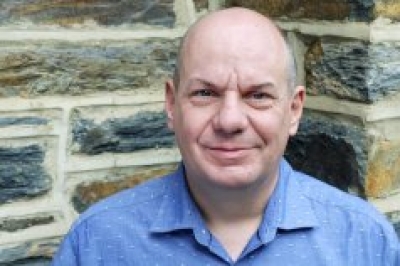
06 July 2015 9:52AM
Summers at Duke University traditionally are a time for change, from construction and renovations to the arrival of new faculty and students. Among the many changes taking place specifically in Social Sciences is the appointment of a new chair. Professor A. Craig Burnside’s five-year term began on June 1, 2015, and he officially has taken up residence in Suite 213.
Burnside is well prepared for the role. Since joining Duke Economics in 2004, the macroeconomist has been an active member of the faculty, taking time from his research and teaching responsibilities to help shape the department.
“Craig has been deeply involved in all aspects of our department — teaching some of the most foundational undergraduate and graduate classes, mentoring researchers at all levels, and leading graduate admissions and faculty recruiting during the years in which the department experienced extraordinary growth and change,” said Professor Thomas Nechyba, former department chair and current director of the Social Science Research Institute (SSRI). “It is only natural that we are now looking to him to lead the department to the next level.
So what’s on the horizon for the Duke Economics? Burnside shared with us his vision for the future of the department.
Why did you accept the position?
I've been at Duke for 11 enjoyable years, and I decided it was the right time to give something back to the department and the university. The chair position is demanding, as I am sure our previous chairs — Tom Nechyba and Pat Bayer — could tell you, so I didn't make this decision lightly. I was eager to take on a new challenge, and having seen Tom and Pat at work, I'd learned a lot about how to do the job well.
What kind of faculty and students are we looking to recruit?
The ultimate goal of any chair is to help the department retain and attract top-notch faculty and graduate students. This means we not only have to be aggressive in recruitment but also maintain a lively, diverse, and productive research environment within the department. We've made great progress in recent years, and I'm hoping to continue that process.
What role do you think the department plays on campus, and how does it impact the university?
At this point, economics is a very wide-ranging and increasingly interdisciplinary field. Over the years, this has led to formal connections between the department and other units on campus. For example, several of our faculty have joint appointments in The Fuqua School of Business, Sanford School of Public Policy, Department of Philosophy, etc. We also have joint master's programs with the Departments of Computer Science and Statistics, and will soon have a joint program with the Department of Political Science. We also have natural ties with SSRI, of which Tom Nechyba is the director.
At one level, these connections propagate the creative things we're doing in economics to other parts of the campus. At another level, the formal ties we have to these other units on campus simply reflect the numerous research-driven collaborations between our faculty and those elsewhere. The filtration of economics into other disciplines is sometimes called the "imperialism of economics." But I think it's a two-way street. Our collaborations are evidence of the health of our discipline and those we interact with.
How have previous chairs helped to shape the department? What are some of your goals for the department during your time as chair?
In the time I've been at Duke we've had two chairs: Tom Nechyba and Pat Bayer. In that time, the department has grown substantially in size and reputation. Tom and Pat both put a lot of time and effort into developing the resources we had available to us, building our relationships on campus, creating the right research environment, overhauling our staff administrative structure, diversifying our faculty, and generally making this a fun place to come to work.
As me move forward, it is clear that we won't continue to grow in size at the same rate as we have in the past. So my big challenge is to continue to move us upward to better things, even as we move close to our steady state in size. As always, this will require me to pay close attention to faculty retention and recruitment. I'd also like to do more to enhance the outcomes from our Ph.D. program, retain our best staff, and somehow manage our ever-evolving need for quality space.
What are you most excited about?
The thing I'm most excited about is learning new things. Of course, I already know a fair amount about the work my colleagues do, but as chair I think there will be many more opportunities to learn about some of the exciting things going on outside my own area.
Is there anything else you would like to add?
Yes, I will come to the Christmas party, but I'm not sure about that whole Santa thing.